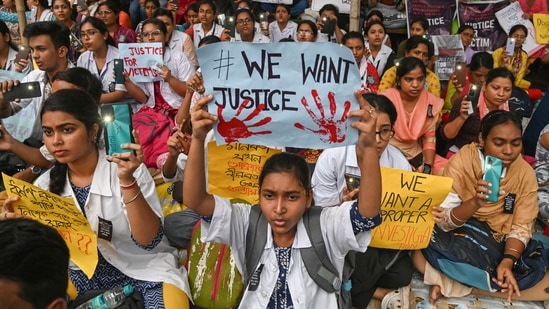Kolkata doctor rape-murder case LIVE: Police
hand over accused Sanjoy Roy to CBI
Aug 14, 2024 7:24 PM
By m.k.karikalsozhan Blog Reporter
Doctors and nursing staff participate in a huge mass rally near RG Kar Medical College and Hospital protesting against rape and murder of a trainee doctor in Kolkata.
The Kolkata Doctor Rape-Murder Case: A Grim Reflection on Society and the Healthcare System
The recent Kolkata doctor rape-murder case has sent shockwaves across India, leading to widespread protests, disruptions in medical services, and a nationwide debate on the safety of women in workplaces. The gruesome incident, which took place at RG Kar Medical College and Hospital, has not only highlighted the vulnerability of women but also exposed significant gaps in the law and order situation in West Bengal.
The Incident and Initial Investigation
The incident came to light when a 31-year-old junior doctor was found dead under suspicious circumstances in a hospital room. What initially seemed to be an unnatural death case quickly escalated into a major controversy when the victim’s parents suspected foul play. They alleged that their daughter had been gang-raped before being murdered, a claim that was further substantiated by the injuries found on her body during the autopsy.
The initial investigation by the Kolkata police was met with severe criticism. The police were accused of mishandling the case, particularly for registering it as an unnatural death rather than a criminal case, leading to delays in crucial evidence collection. The situation took a significant turn when the Calcutta High Court intervened and transferred the investigation to the Central Bureau of Investigation (CBI), questioning the conduct of the police and the college administration.
The Role of Medical Associations and Protests
The response from the medical community was swift and intense. The Federation of Resident Doctors' Association (FORDA) called for an indefinite strike, demanding justice for their deceased colleague and highlighting the broader issue of safety for doctors, especially female practitioners. The strike led to the disruption of outpatient services (OPDs) and surgeries across several hospitals in India, with only emergency services remaining functional.
The Indian Medical Association (IMA) and the Federation of All India Medical Associations (FAIMA) joined the protests, with FAIMA refusing to call off their strike until concrete action was taken. The IMA also sent a team to meet the victim's family, expressing their solidarity and demanding a thorough and transparent investigation by the CBI.
The demands for a Central Protection Act for doctors gained momentum during these protests. Doctors from AIIMS Bhopal, among others, raised the issue of the need for a specific law to protect medical professionals from such heinous crimes, ensuring their safety in the workplace.
Political Reactions and Public Outcry
The case quickly became a political flashpoint, with various parties weighing in on the issue. West Bengal Chief Minister Mamata Banerjee urged the protesting doctors to return to work, while also facing criticism for the state government’s handling of the case. The BJP and Congress led protests against the government, accusing it of delaying the transfer of the case to the CBI and questioning the law and order situation in the state.
Congress leader Adhir Ranjan Chowdhury led a protest march, expressing his outrage over the incident. CPI(M) leader Brinda Karat criticised the state government’s response, particularly questioning why the former principal of the college was merely asked to go on leave rather than being held accountable.
Rahul Gandhi, Congress MP, took to social media to express his horror at the incident, drawing parallels with other high-profile cases of violence against women in India. His comments reflected the deep-rooted issues of safety and justice for women in the country, sparking a broader conversation on the effectiveness of laws like the one enacted post.
Nirbhaya case.
The CBI Investigation and Next Steps
The CBI, upon taking over the investigation, wasted no time in sending a team of forensic experts to Kolkata. The team visited the crime scene and the victim’s residence, gathering evidence and questioning key individuals involved. The victim’s parents reiterated their suspicions of gang rape, and there were calls for the arrest and interrogation of several prominent individuals, including the former principal of RG Kar Medical College and the Kolkata Police Commissioner.
The CBI’s involvement has brought a glimmer of hope for the victim’s family and the medical community, who demand nothing less than a swift and transparent investigation. The agency is under immense pressure to uncover the truth and bring the culprits to justice, setting a precedent for similar cases in the future.
The Impact on the Healthcare System
The impact of this incident on the healthcare system has been profound. The disruption of medical services due to the protests highlighted the critical role that resident doctors play in hospitals across the country. While the strikes were a necessary response to the injustice, they also underscored the need for better protection and working conditions for doctors.
The demand for a Central Protection Act for doctors is not just a knee-jerk reaction to this case but a long-standing issue that needs urgent attention. The safety of healthcare professionals, especially women, is paramount, and the government must take concrete steps to address this.
Conclusion
The Kolkata doctor rape-murder case is a stark reminder of the dangers that women face, even in professional environments that are supposed to be safe. It has exposed the vulnerabilities within the healthcare system and the inadequacies in law enforcement. As the CBI begins its investigation, the nation watches closely, hoping for justice for the victim and a safer future for women in all walks of life.
This case is not just about one tragic incident; it is a wake-up call for society, law enforcement, and the healthcare system to come together and ensure that such a crime never happens again. The protests, the political fallout, and the ongoing investigation all point to a deep-rooted issue that requires immediate and sustained action.


Post a Comment